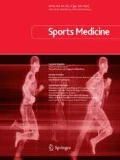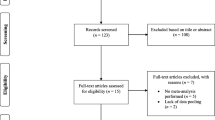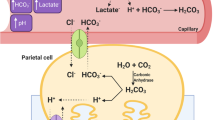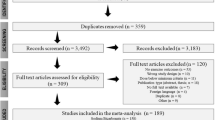Abstract
Background
The effects of sodium bicarbonate on muscular strength and muscular endurance are commonly acknowledged as unclear due to the contrasting evidence on the topic.
Objective
To conduct a systematic review and meta-analysis of studies exploring the acute effects of sodium bicarbonate supplementation on muscular strength and endurance.
Methods
A search for studies was performed using five databases. Meta-analyses of standardized mean differences (SMDs) were performed using a random-effects model to determine the effects of sodium bicarbonate supplementation on muscular strength (assessed by changes in peak force [N], peak torque [N m], or maximum load lifted [kg]) and muscular endurance (assessed by changes in the number of repetitions performed, isokinetic total work, or time to maintain isometric force production). Subgroup meta-analyses were conducted for the muscular endurance of small vs. large muscle groups and muscular strength tested in a rested vs. fatigued state. A random-effects meta-regression analysis was used to explore possible trends in the effects of: (a) timing of sodium bicarbonate ingestion; and (b) acute increase in blood bicarbonate concentration (from baseline to pre-exercise), on muscular endurance and muscular strength.
Results
Thirteen studies explored the effects of sodium bicarbonate on muscular endurance and 11 on muscular strength. Sodium bicarbonate supplementation was found to be ergogenic for muscular endurance (SMD = 0.37; 95% confidence interval [CI]: 0.15, 0.59; p = 0.001). The performance-enhancing effects of sodium bicarbonate were significant for both small (SMD = 0.31; 95% CI: 0.04, 0.59; p = 0.025) and large muscle groups (SMD = 0.40; 95% CI: 0.13, 0.66; p = 0.003). Sodium bicarbonate ingestion was not found to enhance muscular strength (SMD = − 0.03; 95% CI: − 0.18, 0.12; p = 0.725). No significant effects were found regardless of whether the testing was carried out in a rested (SMD = 0.02; 95% CI: − 0.09, 0.13; p = 0.694) or fatigued (SMD = − 0.16; 95% CI: − 0.59, 0.28; p = 0.483) state. No significant linear trends in the effects of timing of sodium bicarbonate ingestion or acute increase in blood bicarbonate concentrations on muscular endurance or muscular strength were found.
Conclusions
Overall, sodium bicarbonate supplementation acutely improves muscular endurance of small and large muscle groups, but no significant ergogenic effect on muscular strength was found.



Similar content being viewed by others
Data Availability Statement
All data generated or analyzed during this study are included in this published article (and its supplementary information files).
References
Maughan RJ, Burke LM, Dvorak J, et al. IOC consensus statement: dietary supplements and the high-performance athlete. Br J Sports Med. 2018;52(7):439–55.
Carr AJ, Hopkins WG, Gore CJ. Effects of acute alkalosis and acidosis on performance: a meta-analysis. Sports Med. 2011;41(10):801–14.
Artioli GG, Gualano B, Coelho DF, et al. Does sodium-bicarbonate ingestion improve simulated judo performance? Int J Sport Nutr Exerc Metab. 2007;17(2):206–17.
Lindh AM, Peyrebrune MC, Ingham SA, et al. Sodium bicarbonate improves swimming performance. Int J Sports Med. 2008;29(6):519–23.
Siegler JC, Hirscher K. Sodium bicarbonate ingestion and boxing performance. J Strength Cond Res. 2010;24(1):103–8.
Lancha Junior AH, Painelli Vde S, Saunders B, et al. Nutritional strategies to modulate intracellular and extracellular buffering capacity during high-intensity exercise. Sports Med. 2015;45(Suppl 1):S71–81.
Mainwood GW, Worsley-Brown PA. The effect of extracellular pH and buffer concentration on the efflux of lactate from frog sartorius muscle. J Physiol. 1975;250(1):1–22.
Mainwood GW, Cechetto D. The effect of bicarbonate concentration on fatigue and recovery in isolated rat diaphragm muscle. Can J Physiol Pharmacol. 1980;58(6):624–32.
Roth D. The sarcolemmal lactate transporter: transmembrane determinants of lactate flux. Med Sci Sports Exerc. 1991;23(8):925–34.
Ren JM, Henriksson J, Katz A, et al. NADH content in type I and type II human muscle fibres after dynamic exercise. Biochem J. 1988;251(1):183–7.
Bangsbo J, Aagaard T, Olsen M, et al. Lactate and H+ uptake in inactive muscles during intense exercise in man. J Physiol. 1995;488(1):219–29.
Carroll TJ, Riek S, Carson RG. Neural adaptations to resistance training: implications for movement control. Sports Med. 2001;31(12):829–40.
Kell RT, Bell G, Quinney A. Musculoskeletal fitness, health outcomes and quality of life. Sports Med. 2001;31(12):863–73.
Bangsbo J, Johansen L, Graham T, et al. Lactate and H+ effluxes from human skeletal muscles during intense, dynamic exercise. J Physiol. 1993;462:115–33.
Requena B, Zabala M, Padial P, et al. Sodium bicarbonate and sodium citrate: ergogenic aids? J Strength Cond Res. 2005;19(1):213–24.
Carr BM, Webster MJ, Boyd JC, et al. Sodium bicarbonate supplementation improves hypertrophy-type resistance exercise performance. Eur J Appl Physiol. 2013;113(3):743–52.
Coombes J, McNaughton LR. Effects of bicarbonate ingestion on leg strength and power during isokinetic knee flexion and extension. J Strength Cond Res. 1993;7(4):241–9.
Siegler JC, Marshall P, Pouslen MK, et al. The effect of pH on fatigue during submaximal isometric contractions of the human calf muscle. Eur J Appl Physiol. 2015;115(3):565–77.
Spriet LL, Lindinger MI, Heigenhauser GJ, et al. Effects of alkalosis on skeletal muscle metabolism and performance during exercise. Am J Physiol. 1986;251(5 Pt 2):R833–9.
Casarin CAS, Battazza RA, Lamolha MA, et al. Sodium bicarbonate supplementation improves performance in isometric fatigue protocol. Rev Br Med Esporte. 2019;25(1):40–4.
Ansdell P, Dekerle J. Sodium bicarbonate supplementation delays neuromuscular fatigue without changes in performance outcomes during a basketball match simulation protocol. J Strength Cond Res. 2017. https://doi.org/10.1519/JSC.0000000000002233.
Heibel AB, Perim PHL, Oliveira LF, et al. Time to optimize supplementation: modifying factors influencing the individual responses to extracellular buffering agents. Front Nutr. 2018;5:35.
Webster MJ, Webster MN, Crawford RE, et al. Effect of sodium bicarbonate ingestion on exhaustive resistance exercise performance. Med Sci Sports Exerc. 1993;25(8):960–5.
Matson LG, Tran ZV. Effects of sodium bicarbonate ingestion on anaerobic performance: a meta-analytic review. Int J Sport Nutr. 1993;3(1):2–28.
Lopes-Silva JP, Reale R, Franchini E. Acute and chronic effect of sodium bicarbonate ingestion on Wingate test performance: a systematic review and meta-analysis. J Sports Sci. 2019;37(7):762–71.
Lopes-Silva JP, Choo HC, Franchini E, et al. Isolated ingestion of caffeine and sodium bicarbonate on repeated sprint performance: a systematic review and meta-analysis. J Sci Med Sport. 2019;22(8):962–72.
Grgic J, Garofolini A, Pickering C, et al. Isolated effects of caffeine and sodium bicarbonate ingestion on performance in the Yo–Yo test: a systematic review and meta-analysis. J Sci Med Sport. 2019. https://doi.org/10.1016/j.jsams.2019.08.016.
Peart DJ, Siegler JC, Vince RV. Practical recommendations for coaches and athletes: a meta-analysis of sodium bicarbonate use for athletic performance. J Strength Cond Res. 2012;26(7):1975–83.
Moher D, Liberati A, Tetzlaff J, et al. Preferred reporting items for systematic reviews and meta-analyses: the PRISMA statement. PLoS Med. 2009;6(7):e1000097.
McNaughton LR, Gough L, Deb S, et al. Recent developments in the use of sodium bicarbonate as an ergogenic aid. Curr Sports Med Rep. 2016;15(4):233–44.
Maher CG, Sherrington C, Herbert RD, et al. Reliability of the PEDro scale for rating quality of randomized controlled trials. Phys Ther. 2003;83(8):713–21.
Grgic J, Trexler ET, Lazinica B, et al. Effects of caffeine intake on muscle strength and power: a systematic review and meta-analysis. J Int Soc Sports Nutr. 2018;15:11.
Grgic J, Pickering C. The effects of caffeine ingestion on isokinetic muscular strength: a meta-analysis. J Sci Med Sport. 2019. 2019;22(3):353–60.
Grgic J. Caffeine ingestion enhances Wingate performance: a meta-analysis. Eur J Sport Sci. 2018;18(2):219–25.
Borenstein M, Hedges LV, Higgins JP, et al. A basic introduction to fixed-effect and random-effects models for meta-analysis. Res Synth Methods. 2010;1(2):97–111.
Higgins JPT, Deeks JJ, Altman DG, on behalf of the Cochrane Statistical Methods Group, editors. Chapter 16.1.3.2. Imputing standard deviations for changes from baseline. In: Higgins JP, Green S, editors. Cochrane handbook for systematic reviews of interventions. Version 5.1.0 (updated March 2011). Cochrane Collaboration, Chichester, UK; 2011.
Warren GL, Park ND, Maresca RD, et al. Effect of caffeine ingestion on muscular strength and endurance: a meta-analysis. Med Sci Sports Exerc. 2010;42(7):1375–87.
Sostaric SM, Skinner SL, Brown MJ, et al. Alkalosis increases muscle K+ release, but lowers plasma [K+] and delays fatigue during dynamic forearm exercise. J Physiol. 2006;570(Pt 1):185–205.
Balberman SE. The effects of induced alkalosis and acidosis on the work output of the knee extensor and flexor muscle groups [Masters thesis]. The University of Arizona; 1983.
Duncan MJ, Weldon A, Price MJ. The effect of sodium bicarbonate ingestion on back squat and bench press exercise to failure. J Strength Cond Res. 2014;28(5):1358–66.
Farney TM, MacLellan MJ, Hearon CM, et al. The effect of aspartate and sodium bicarbonate supplementation on muscle contractile properties among trained men. J Strength Cond Res. 2018. https://doi.org/10.1519/JSC.0000000000002692.
Hunter AM, De Vito G, Bolger C, et al. The effect of induced alkalosis and submaximal cycling on neuromuscular response during sustained isometric contraction. J Sports Sci. 2009;27(12):1261–9.
Materko W, Santos EL, Novaes JDS. Effect of bicarbonate supplementation on muscular strength. J Exerc Physiol Online. 2008;11(6):25–33.
Maughan RJ, Leiper JB, Litchfield PE. The effects of induced acidosis and alkalosis on isometric endurance capacity in man. In: Dotson CO, Humphrey JH, editors. Exercise physiology, current selected research, vol. 2. New York: AMS Press; 1986. p. 73–82.
Page R, Siegler JC. The effects of sodium bicarbonate ingestion on exhaustive bench press performance. Med Sci Sports Exerc. 2011;43(S5):847–8.
Portington KJ, Pascoe DD, Webster MJ, et al. Effect of induced alkalosis on exhaustive leg press performance. Med Sci Sports Exerc. 1998;30(4):523–8.
Raymer GH, Marsh GD, Kowalchuk JM, et al. Metabolic effects of induced alkalosis during progressive forearm exercise to fatigue. J Appl Physiol. 2004;96(6):2050–6.
Siegler JC, Marshall PW, Raftry S, et al. The differential effect of metabolic alkalosis on maximum force and rate of force development during repeated, high-intensity cycling. J Appl Physiol. 2013;115(11):1634–40.
Siegler JC, Marshall P. The effect of metabolic alkalosis on central and peripheral mechanisms associated with exercise-induced muscle fatigue in humans. Exp Physiol. 2015;100(5):519–30.
Siegler JC, Mudie K, Marshall P. The influence of sodium bicarbonate on maximal force and rates of force development in the triceps surae and brachii during fatiguing exercise. Exp Physiol. 2016;101(11):1383–91.
Siegler JC, Marshall PWM, Finn H, et al. Acute attenuation of fatigue after sodium bicarbonate supplementation does not manifest into greater training adaptations after 10-weeks of resistance training exercise. PLoS One. 2018;13(5):e0196677.
McNaughton LR. Sodium bicarbonate ingestion and its effects on anaerobic exercise of various durations. J Sports Sci. 1992;10(5):425–35.
Donaldson SK, Hermansen L, Bolles L. Differential, direct effects of H+ on Ca2+-activated force of skinned fibers from the soleus, cardiac and adductor magnus muscles of rabbits. Pflugers Arch. 1978;376(1):55–65.
Fabiato A, Fabiato F. Effects of pH on the myofilaments and the sarcoplasmic reticulum of skinned cells from cardiac and skeletal muscles. J Physiol. 1978;276:233–55.
Carr AJ, Slater GJ, Gore CJ, et al. Effect of sodium bicarbonate on [HCO3-], pH, and gastrointestinal symptoms. Int J Sport Nutr Exerc Metab. 2011;21(3):189–94.
Saunders B, Sale C, Harris RC, et al. Sodium bicarbonate and high-intensity cycling capacity: variability in responses. Int J Sports Physiol Perform. 2014;9(4):627–32.
Hilton NP, Leach NK, Sparks SA, et al. A novel ingestion strategy for sodium bicarbonate supplementation in a delayed-release form: a randomised crossover study in trained males. Sports Med Open. 2019;5(1):4.
Saunders B, de Oliveira LF, da Silva RP, et al. Placebo in sports nutrition: a proof-of-principle study involving caffeine supplementation. Scand J Med Sci Sports. 2017;27(11):1240–7.
Mora-Rodriguez R, Hamouti N. Salt and fluid loading: effects on blood volume and exercise performance. Med Sport Sci. 2012;59:113–9.
Bishop D, Claudius B. Effects of induced metabolic alkalosis on prolonged intermittent-sprint performance. Med Sci Sports Exerc. 2005;37(5):759–67.
Edge J, Bishop D, Goodman C. Effects of chronic NaHCO3 ingestion during interval training on changes to muscle buffer capacity, metabolism, and short-term endurance performance. J Appl Physiol. 2006;101(3):918–25.
Bishop DJ, Thomas C, Moore-Morris T, et al. Sodium bicarbonate ingestion prior to training improves mitochondrial adaptations in rats. Am J Physiol Endocrinol Metab. 2010;299(2):E225–33.
Tillin NA, Pain MT, Folland J. Explosive force production during isometric squats correlates with athletic performance in rugby union players. J Sports Sci. 2013;31(1):66–76.
Jones RL, Stellingwerff T, Artioli GG, et al. Dose-response of sodium bicarbonate ingestion highlights individuality in time course of blood analyte responses. Int J Sport Nutr Exerc Metab. 2016;26(5):445–53.
Gough LA, Deb SK, Sparks SA, et al. Sodium bicarbonate improves 4 km time trial cycling performance when individualised to time to peak blood bicarbonate in trained male cyclists. J Sports Sci. 2018;36(15):1705–12.
Author information
Authors and Affiliations
Corresponding author
Ethics declarations
Funding
No sources of funding were used to assist in the preparation of this article. Bryan Saunders (2016/50438-0 and 2017/04973-4) has been financially supported by Fundação de Amparo à Pesquisa do Estado de São Paulo.
Conflict of Interest
Jozo Grgic, Ramon F. Rodriguez, Alessandro Garofolini, Bryan Saunders, David J. Bishop, Brad J. Schoenfeld and Zeljko Pedisic have no conflicts of interest that are directly relevant to the content of this article.
Author Contributions
JG conceived the idea for the review. JG and RFR conducted the study selection and data extraction. JG and AG conducted the quality assessment. JG conducted the statistical analyses. JG drafted the initial manuscript. RFR, AG, BS, DJB, BJS, and ZP contributed to writing the manuscript. All authors approved the final version of the manuscript.
Electronic supplementary material
Below is the link to the electronic supplementary material.
Rights and permissions
About this article
Cite this article
Grgic, J., Rodriguez, R.F., Garofolini, A. et al. Effects of Sodium Bicarbonate Supplementation on Muscular Strength and Endurance: A Systematic Review and Meta-analysis. Sports Med 50, 1361–1375 (2020). https://doi.org/10.1007/s40279-020-01275-y
Published:
Issue Date:
DOI: https://doi.org/10.1007/s40279-020-01275-y




